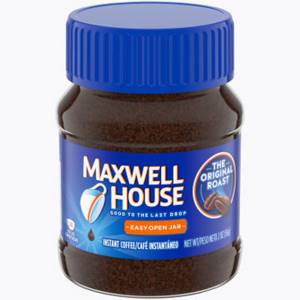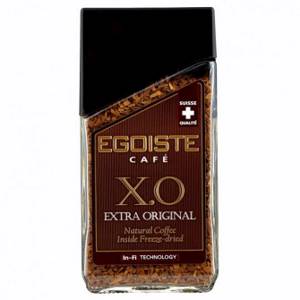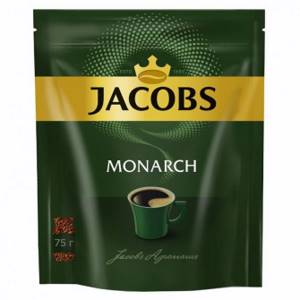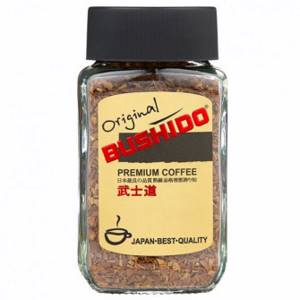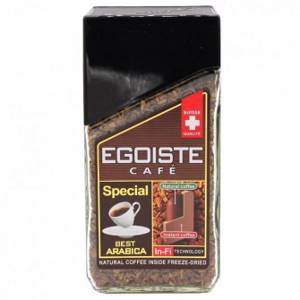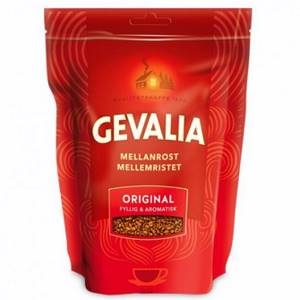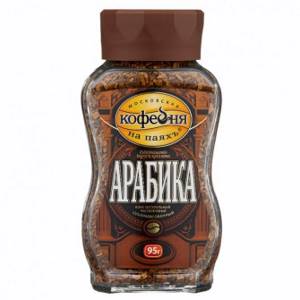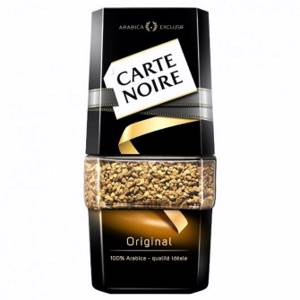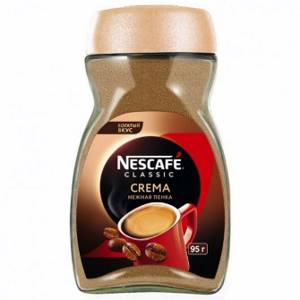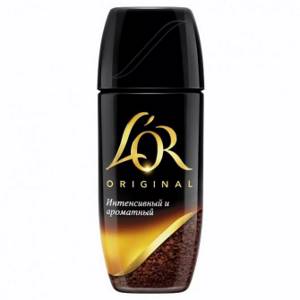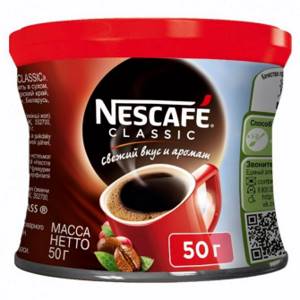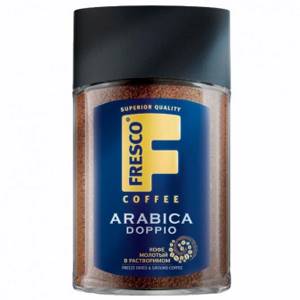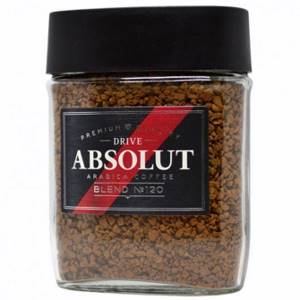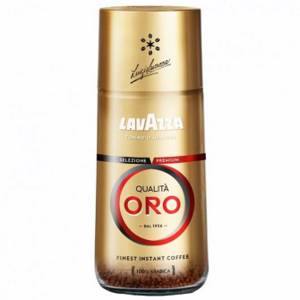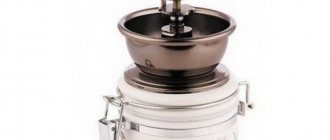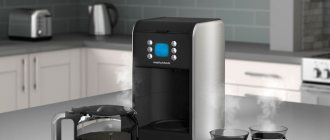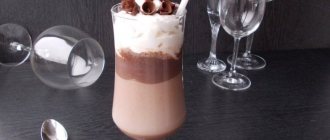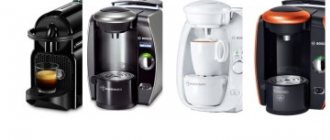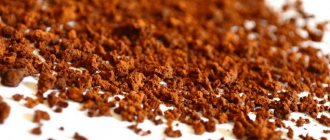Invention of instant coffee
The history of this drink began at the beginning of the 20th century in America. In fact, the idea of creating instant coffee belongs to the Japanese-American scientist Satori Kato , who invented the method for producing this product.
But practically it was George Constant Washington , an American entrepreneur and inventor who lived for some time in Guatemala and was engaged in agriculture, who invented the technology for producing instant coffee on an industrial scale. Upon returning to America in 1909, Washington founded his own business and launched Red E Coffee, the first commercially produced instant coffee. Washington's company subsequently became the main supplier of coffee to the American Army during and after World War I. But despite the success of the business, the quality and unpleasant taste of early instant coffee were noted.
More extensive research into creating instant coffee as we know it today began in the 1930s in Brazil, which was (and remains to this day) the world's largest producer and importer of coffee. The problem was that for several years Brazil had been faced with an overproduction of green coffee. After drying and initial processing, millions of bags of coffee beans remained unclaimed, and it was very difficult to store them for a long time. Therefore, the Brazilian government decided to turn to the Swiss leadership with a request to help solve the problem of surplus coffee crops.
Max Morgenthaler at Nestlé, was tasked with creating a way to preserve and process coffee beans. After four years of scientific research and practical testing, Nestle decided to stop the experiment and closed the project. But Morgenthaler did not give up, continuing to work on creating a “coffee cube” technology that would withstand long-term storage and turn into a drink after adding hot water, while maintaining the properties of the coffee beans.
In his free time after work, Morgenthaler, purchasing coffee with his own funds, continued to create instant coffee. Two years later, in 1936, Morgenthaler was finally able to capture the aroma of coffee, which had previously been lost during the processing of beans, and transfer it to the final product.
As a result, in 1938, in industrial conditions, soluble coffee powder was first produced, called “Nescafé” , and subsequently became incredibly popular throughout the world.
Voting for the best instant coffee
What instant coffee would you choose or recommend?
Davidoff Fine Aroma
0.00 % ( 0 )
Egoiste X/O Extra Original
33.33 % ( 1 )
Jacobs Monarch
0.00 % ( 0 )
Bushido Original
0.00 % ( 0 )
Egoiste Special
0.00 % ( 0 )
Gevalia Original
0.00 % ( 0 )
Arabica, Moscow coffee shop on shares
0.00 % ( 0 )
Carte Noire Original
0.00 % ( 0 )
Nescafe Classic Crema
0.00 % ( 0 )
LOR Original
0.00 % ( 0 )
Nescafe Classic
33.33 % ( 1 )
Fresco doppio
33.33 % ( 1 )
Absolut Drive blend No. 120
0.00 % ( 0 )
Methods for producing instant coffee
The whole essence of making instant coffee comes down to the following technological processes:
- Roasting green coffee beans;
- Grinding roasted coffee;
- Treatment of ground coffee with hot water, or extraction, i.e. brewing coffee.
These stages of the technological process are similar to how coffee is prepared at home, only this happens on an industrial scale. Next, the resulting coffee extract is filtered, separated from the grounds, and dried. That is, the last stage of the technological process is drying, which determines the type of instant coffee obtained. Thus, it can be of the following types:
- powder _ This coffee is produced using spray dry technology, “spray drying”. The coffee extract is sprayed into a stream of very hot air and dries into a powder;
- granular _ This type of coffee is produced from powdered coffee, which is made by spray drying, adding another step to the technological process - aggregation, which, in essence, is the wetting of coffee powder to form granules. Such granules then, during storage of the finished product, can again disintegrate and turn into powder;
- freeze-dried . This coffee is produced using freeze dry technology, “freeze drying”. The coffee extract is frozen, then crushed into small crystals, and then dehydrated by sublimation in a vacuum. After the water evaporates, the dry extract retains its crystal form, acquiring a caramel color.
This manufacturing method best preserves the flavor and aromatic substances of the coffee extract, but due to the fact that this technology is the most energy- and labor-intensive, freeze-dried instant coffee is more expensive than powdered and granulated coffee.
TOP 14 best brands of instant coffee
After studying our rating, you can choose one or more coffee options from the 14 best. The list includes both well-known manufacturers, such as Lavazza or Nescafe, and others, less well-known – Fresco doppio, Gelavia Original.
| Photo | Name | Rating | Price | |
| #1 | Davidoff Fine Aroma | ⭐ 100 / 100 | Find out the price | |
| #2 |
| Egoiste X/O Extra Original | ⭐ 99 / 100 1 - voice | Find out the price |
| #3 |
| Jacobs Monarch | ⭐ 98 / 100 | Find out the price |
| #4 |
| Bushido Original | ⭐ 97 / 100 | Find out the price |
| #5 |
| Egoiste Special | ⭐ 96 / 100 | Find out the price |
| #6 |
| Gevalia Original | ⭐ 95 / 100 | Find out the price |
| #7 |
| Arabica, Moscow coffee shop on shares | ⭐ 94 / 100 | Find out the price |
| #8 |
| Carte Noire Original | ⭐ 93 / 100 | Find out the price |
| #9 |
| Nescafe Classic Crema | ⭐ 92 / 100 | Find out the price |
| #10 |
| LOR Original | ⭐ 91 / 100 | Find out the price |
| #11 |
| Nescafe Classic | ⭐ 90 / 100 1 - voice | Find out the price |
| #12 |
| Fresco doppio | ⭐ 89 / 100 1 - voice | Find out the price |
| #13 |
| Absolut Drive blend No. 120 | ⭐ 88 / 100 | Find out the price |
| #14 |
| Lavazza Qualita Oro | ⭐ 87 / 100 | Find out the price |
What instant coffee would you choose or recommend?
Take the survey
Raw materials for the production of instant coffee
Each manufacturer of this product, through advertising, convinces its consumers that only Arabica beans of the highest quality are used to produce instant coffee. But the reality is that if this were true, then the price of instant coffee would be many times higher than that of beans. The price for 100 g of instant coffee is already higher than the cost of the same amount of beans due to the use of energy-intensive processes to produce a soluble analogue of natural coffee. In addition, due to the peculiarities of the technological process for making instant coffee, most of the aromatic and flavoring substances of coffee beans are lost in the process. Thus, using high-quality beans to produce ersatz coffee is not economically profitable.
It is also worth considering the fact that high-grade Arabica beans are bought by roasting companies that produce natural bean coffee. For the production of instant coffee, coffee beans are mainly used that remain unclaimed in the natural coffee market: they have not been sorted for defects, do not have a unique or simply good flavor potential (mediocre grain), sometimes even affected by disease (mold, fungi) or simply beans obtained from unripe coffee berries.
Another source of raw material for the production of instant coffee is robusta . The beans of this type of coffee do not have such a bright taste and aroma as Arabica, but Robusta contains more caffeine, which is even an advantage in cases where a person wants to get not so much taste from a cup of coffee (it can be “masked” with milk or sugar, if it is unpleasant), how much is just a charge of cheerfulness. In addition, Robusta is quite unpretentious in cultivation, which allows you to grow this type of coffee without special costs, unlike Arabica, which ultimately can have a positive effect on the price of the finished product, to which Robusta was added.
Despite some shortcomings, instant coffee has long conquered the market and enjoys well-deserved popularity among consumers. Let the aromatic drink delight you every morning!
Voting rights of the people's jury
In the first round, ordinary people were invited to conduct a tasting of the proposed samples. For them, it is not the quality composition of the drink that is important, but the aroma, taste and presence of bitterness. People could only cast one vote for their favorite sample.
The priorities were:
- Jardin.
- Ambassador.
- Moccona.
The absolute leader was Jardin coffee.
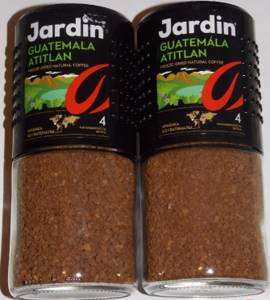
Black Card coffee seemed tasteless to many lovers of the invigorating drink; some tasters called this coffee powder.
Many manufacturers of this invigorating drink claim that the freeze-dried drink is made from 100% Arabica beans. In fact, the majority of the instant drink consists of robusta. The cheaper the coffee, the higher the percentage of this component in the composition. This move by the manufacturer is very profitable in economic terms. After all, the cost of Robusta is several times lower than the cost of Arabica, and the caffeine content is almost 2 times higher.
Coffee may contain substances harmful to humans - aflatoxins. They are waste products of microscopic mold fungi and appear in instant coffee when moisture standards are violated. The toxic effect of aflatoxins has a detrimental effect on the human body. Harmful substances affect vital organs: liver, brain, kidneys and lungs. It is to determine the presence of dangerous compounds in the drink that coffee is sent for laboratory testing.
You might be wondering: Where is there more caffeine in tea or coffee?
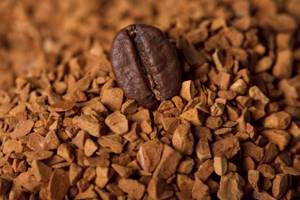
Freeze-dried coffee: rating by brand
Jardin – Russian representative
The manufacturer's line includes sublimate from different varieties of Arabica. Caffeine content – from 1.41% to 2.35%. The smell is bright, with fruity sourness, weakens when brewed. The taste is soft, with coffee and chocolate notes. Bitterness is inherent, but does not interrupt the aftertaste.
The granules are light brown in color, the same shape, without powder at the bottom of the jar. There is no sediment when brewing. The cost varies depending on the container, volume and variety. The price starts from 260 rubles.
What brands do you buy?
RussianForeign
Premium Moccona with a pleasant aftertaste
The brand is the property of the Douwe Egberts Corporation. Made from different types of Arabica. More often, from a whole blend. The color is slightly darker than Jardin or Jacobs, which makes this type of sublimate perceived as stronger. It contains 4-5% caffeine.
Interesting! Recipes for making Irish coffee at home, composition and proper serving
The aroma is deep and expressive, and is not lost even after brewing. The drink has an unobtrusive bitterness and a pleasant aftertaste.
When poured with hot water, the granules dissolve well, there is no sediment. The average cost of one can is 260 rubles.
The manufacturer also produces a premium line with different scents: nutty, chocolate. The price starts from 360 rubles.
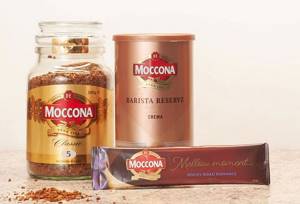
Grandos – 100% Arabica
German Grandos quality is combined with harmonious taste and aroma. The cost of one can starts from 300 rubles. This is a rare item in stores. Therefore, they purchase it online from specialized resources.
The drink harmoniously combines sourness with bitterness. A pleasant aftertaste is obtained due to the use of natural Arabica coffee.
The mixture consists of light particles of the same size, without powder at the bottom. The smell is pronounced, but not pungent.
Korean Taster's Choice on the Russian market
The brand has three types: decaffeinated, mild and strong with 4% caffeine. The price varies from 250 to 350 rubles, depending on the variety and packaging.
The color of the granules is light, the size is the same, there is no scree. Dissolves without settling. The smell is pronounced, the aftertaste is bitter if we are talking about a strong version. It is suitable for lovers of drinks without sourness.
Have you heard of this brand before?
Not really
Carte Noire – French black card
The name is translated as a black card, but this brand has nothing in common with the Russian “Black Card”. The Carte Noire brand is presented on the market in the form of custard and freeze-dried. The cost starts from 350 rubles.
The sublimate granules are light and identical in size. The aroma is pronounced, pleasant, and persists after brewing. There is no sediment. Carte Noire tastes strong, but without a cloying bitterness. The acidity is also present, since the base consists of Arabica, although it is not very pronounced.
Important! Cost does not always reflect quality. It happens that the consumer pays for the brand, but not for the properties.
"Moscow coffee shop on shares" - Russian representative in the ranking of the best
In the Russian market, this brand is among the leaders. Compared to other brands, its cost is low, but this does not affect the quality. The manufacturer classifies it as premium. The average price is 220 rubles.
The particles of the mixture are identical, with a light tint. The smell is not sharp, rich. The aftertaste is harmonious, pleasant, with a slight bitterness and sourness.
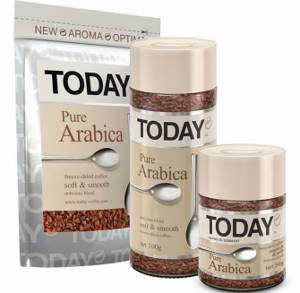
Pure Arabica is a worthy representative
There are several types of brand on the market. The Today brand includes Pure Arabica, Espresso, Enjoy, New City, Premium, Coffee Selection.
Pure Arabica is widespread among consumers. It contains 100% Arabica. The roasting of the beans is medium, which results in a harmonious taste, without excessive bitterness or acidity.
The mixture particles are the same, without powder dust. After brewing there is no sediment, it dissolves quickly. The smell is pronounced, pleasant, and remains even after pouring.
Cost from 220 rubles and above, depending on the amount of mixture in the package and container.
Interesting! What is cappuccino, its composition and recipes for making coffee at home
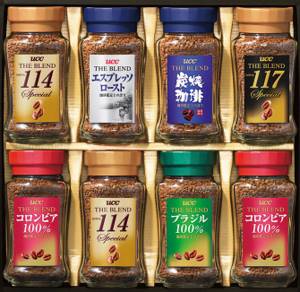
Japanese UCC for connoisseurs
The price for a small UCC jar is 350 rubles. But the cost does not deter coffee lovers, as the drink is worth it. The use of new technologies (drying and freezing) allows us to preserve a pleasant aroma and taste.
The composition is homogeneous, light brown in color. The mixture particles are identical, without debris at the bottom. The aroma is preserved when brewed. The taste harmoniously combines bitterness with mild sourness. The aftertaste is pleasant.
Bushido with chocolate flavor
This freeze-dried coffee belongs to the premium class. The cost starts from 800 rubles.
The difference between this drink and the others is its expressive strength with chocolate notes. The mixture particles are the same size and light in color. The smell from the jar is pleasant, pronounced. When brewing, it is not lost and spreads throughout the house.
The sublimate dissolves well and does not form sediment. The bitter taste makes it difficult to drink without sugar or sweeteners.
Egoiste – Swiss quality
The cost of one can is 350-500 rubles. But Egoiste is worth it, as it is the best among instant drinks.
Sublimate granules are identical, there are no small particles or dust. The smell is rich, not pungent, and when poured with water it becomes less pronounced. The difference between this type and others is its specific aftertaste, which resembles the taste of chocolate and nuts.
Have you tried Egoiste coffee?
Not really
Jacobs Monarch for sour lovers
This good freeze-dried German coffee has been on the world market for a long time - since 1895. It is distinguished by its affordable price, which is 350 rubles. Jacobs Monarch contains 3.35% caffeine by weight, which is considered average.
The granules are smooth and do not crumble.
Expert opinion
Vadim Kudryavtsev
Coffee expert, professional barista and simply in love with this aromatic drink.
Ask the barista a question
The smell is pleasant, persistent, but when brewing it becomes insignificant. The taste is not very bright, but with pronounced sourness, which is the main difference between this brand.
The solubility of the granules is average, but without sediment and additional inclusions.
Strong Swiss Nescafe Gold
Nescafe Gold is based on Arabica, which gives the drink a high strength of 4-5%. It can be sublimated, granular and powder. Originally brought to market in powder form in 1938.
The sublimate granules are light in color and have scree at the bottom. Dissolve quickly, without unnecessary sedimentation. The smell is strong, but not harsh, and is not lost during brewing. The taste of the drink is strong and bitter.
The average price for a can of this freeze-dried coffee is 360 rubles.
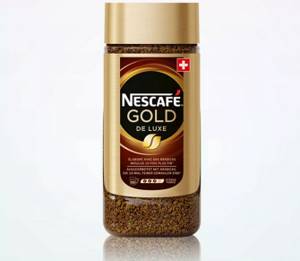
Tchibo Exclusive – a mixture of Arabica and Robusta
The price of this German brand corresponds to the quality and is 300 rubles per jar. Its granules consist of a mixture of two varieties - Arabica and Robusta. This gives the drink strength and a pleasant aroma. There is less caffeine here than in the previous version - 3.1%.
The smell is expressive and remains during brewing. This drink is more harmonious in taste than Jacobs, since the sourness here is less pronounced. At the same time, there is a feeling of sufficient strength. When poured with hot water, the sublimate dissolves quickly, no sediment is observed.
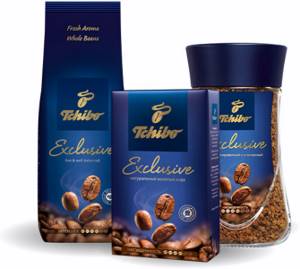
Inexpensive strong MacCoffee
Of the options presented, this brand is the most affordable. The average price is 220 rubles. The manufacturer MacCoffee is better known for its 3-in-1 sachets, which contain powdered coffee with sugar and dry cream. But there is also a sublimate on the market. Supplier country: Brazil.
Interesting! What is Robusta and how is it different from Arabica?
Freeze-dried coffee is light brown in color, with uniform particles. A distinctive feature is a sharp aroma, but when poured with water it disappears. Solubility is average, without sediment. The taste is expressive due to the inexpensive flavors that are used in the production of the sublimate.
Maxwell House – bitter sublimate from a mixture of coffee varieties
This brand is made from a combination of two varieties - Arabica and Robusta. This gives it an expressive bitterness. It consists of small light brown particles, many small ones are present.
The smell is not very pronounced, and when brewing it becomes even less noticeable. The aroma is subtle. The taste of the drink is also unexpressed, but with an increase in the dose of coffee mixture it acquires intense bitterness. The aftertaste is sour. The cost of one can is from 220 rubles.
